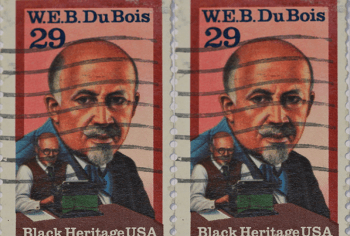Andrew Lanham in Boston Review:
 February 1951 was a busy month for W. E. B. Du Bois, who turned eighty-three and threw himself a huge birthday party to raise funds for African decolonization. He also married his second wife, the leftist writer Shirley Graham, in what the Baltimore Afro-American newspaper called the wedding of the year. And he was indicted, arrested, and arraigned in federal court as an agent of the Soviet Union because he had circulated a petition protesting nuclear weapons. The Justice Department saw Du Bois’s petition as a threat to national security. They thought it was communist propaganda meant to encourage American pacifism in the face of Soviet aggression. They put Du Bois on trial in order to brand him as “un-American,” to use the language of Joe McCarthy’s House Un-American Activities Committee. Du Bois was not in fact a Soviet agent. He was an American citizen using his First Amendment rights to protest nuclear weapons on his own behalf. A federal judge acquitted him because prosecutors failed to present any evidence.
February 1951 was a busy month for W. E. B. Du Bois, who turned eighty-three and threw himself a huge birthday party to raise funds for African decolonization. He also married his second wife, the leftist writer Shirley Graham, in what the Baltimore Afro-American newspaper called the wedding of the year. And he was indicted, arrested, and arraigned in federal court as an agent of the Soviet Union because he had circulated a petition protesting nuclear weapons. The Justice Department saw Du Bois’s petition as a threat to national security. They thought it was communist propaganda meant to encourage American pacifism in the face of Soviet aggression. They put Du Bois on trial in order to brand him as “un-American,” to use the language of Joe McCarthy’s House Un-American Activities Committee. Du Bois was not in fact a Soviet agent. He was an American citizen using his First Amendment rights to protest nuclear weapons on his own behalf. A federal judge acquitted him because prosecutors failed to present any evidence.
Nevertheless, the trial and the publicity around it ruined his career. He was left scrabbling to earn enough money just to buy groceries. And the trial hardly ended the state persecution. In 1952 the State Department illegally revoked Du Bois’s passport to stop him from traveling to a peace conference in Canada (and, implicitly, to prevent him from moving to a friendlier country where he was not blacklisted). The Supreme Court restored passport rights for suspected communists in 1958, and three years later Du Bois used his regained freedom of travel to become an expat in newly postcolonial Ghana. But while he was there, the State Department refused to renew his passport, effectively annulling his United States citizenship. The American civil rights icon became a Ghanaian citizen and died there in 1963.
More here. (Note: Throughout February, we will publish at least one post dedicated to Black History Month)
